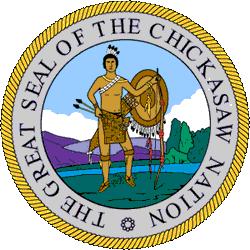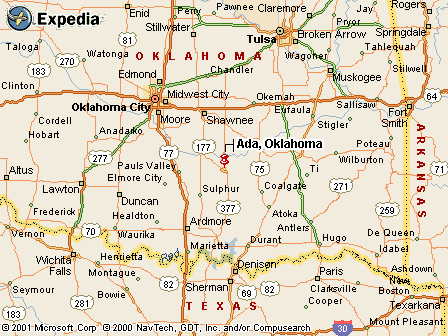|
|
Canku Ota |
|
|
(Many Paths) |
||
|
An Online Newsletter Celebrating Native America |
||
|
September 8, 2001 - Issue 44 |
||
|
|
||
|
Tribe Casts Medals for Original Enrollees |
||
|
by Ann DeFrange Staff Writer-News from Oklahoma-September 3, 2001 |
 "There
wasn't even an Oklahoma when I was born." "There
wasn't even an Oklahoma when I was born."At age 98, Daisy Blackbird has seniority over Oklahoma's statehood status, and that many years in this state have cast her as a key player in some of the most significant moments and movements Oklahoma has seen. The Oklahoma City resident has received a singular honor from the Chickasaw Nation. The tribe is seeking out its elders, the surviving men and women like herself whose names were on the original rolls of the Dawes Commission, an agency established in 1893 to negotiate land allotment among Indians and clear the way for Oklahoma to become a state. The tribe believes about 30 original enrollees may be alive. Special medals have been cast in their honor. "Daisy, and all of our original enrollees, are an important part of Chickasaw history," Chickasaw Nation Gov. Bill Anoatubby said. "The only way we can establish our heritage as Chickasaws today is to trace our ancestry back to these original enrollees." Chickasaw heritage and the Dawes Commission weren't prominent issues when Blackbird was growing up in Indian Territory. She is a one-woman merger of cultures that formed Oklahoma. Her maternal grandparents were Chickasaw, a tribe removed from the East and resettled in Oklahoma -- her family in Pontotoc, Indian Territory. Her paternal grandparents came from Canada and made the 1889 land run to obtain land originally designated for American Indians; they homesteaded in what would become the Britton community of north Oklahoma City. Eleven children -- one- quarter Chickasaw -- were born to her parents. In 1905, when she was 2, her name was written in the records of Chickasaw citizens. As Number NB191 (the initials stand for "newborn"), she joined her mother, one brother and two sisters -- and her father, who was registered as a Chickasaw by marriage. The U.S. Congress had decided that it was in the best interest to dissolve the sovereign governments of the Indian nations, to break up the communal land the tribes held, to give back 160 acres to each Indian and make all the tribal members U.S. citizens. The Dawes Commission failed at its task. It compiled a census of Oklahoma Indians, but instead of tearing down the tribes, the census formed a basis for heritage and identification. Today, anyone who claims citizenship in the Five Civilized Tribes must prove a blood line to an ancestor on the original commission rolls. Her mother died when she was young; she grew up in the traditions of her father's people. She attended college and came home to teach in Tupelo and Coalgate. In the 1940s, she stepped out of the ordinary again. Long before career women were common, she pursued a professional career in state government offices. She was a clerk for the Oklahoma Supreme Court when she met a red-haired white man with a lively sense of humor. She married Supreme Court Justice William Henry Blackbird. With him, she lived through a few more footnotes in Oklahoma history. Judge Blackbird sat on the court when bribery scandals shook the state's judicial system, but he was one of the good guys, credited with leading the court through shaky times. He retired in 1971 and died in 1976. Although she hasn't been aware of her heritage until recent years, the Chickasaw Nation is aware of her. Anoatubby said, "We are continuing our search for original Chickasaw enrollees so we can honor them with a special medal recognizing their unique position in tribal history. "While the Dawes Commission was created to divide tribal land among individual citizens and ultimately dissolve our tribal government, the Chickasaw Nation is thriving more than 100 years after that plan was first put into action. "Our original enrollees serve as a living testimony that the Chickasaw Nation truly is unconquered and unconquerable. Our goal is to honor each and every one." |
|
|
|
Chickasaw Nation |
|
|
||
|
|
||
| Canku Ota is a free Newsletter celebrating Native America, its traditions and accomplishments . We do not provide subscriber or visitor names to anyone. Some articles presented in Canku Ota may contain copyright material. We have received appropriate permissions for republishing any articles. Material appearing here is distributed without profit or monetary gain to those who have expressed an interest. This is in accordance with Title 17 U.S.C. section 107. | ||
|
Canku Ota is a copyright © 2000, 2001 of Vicki Lockard and Paul Barry. |
||
|
|
|
|
|
The "Canku Ota - A Newsletter Celebrating Native America" web site and its design is the |
||
|
Copyright © 1999, 2000, 2001 of Paul C. Barry. |
||
|
All Rights Reserved. |
||

